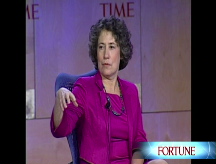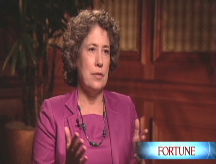FDIC chief: Intervene on foreclosures
Bank efforts to modify mortgages for troubled homeowners fail to reduce foreclosures - Sheila Bair urges resistant investors to be 'fiscally responsible.'
| 30 yr fixed | 3.80% |
| 15 yr fixed | 3.20% |
| 5/1 ARM | 3.84% |
| 30 yr refi | 3.82% |
| 15 yr refi | 3.20% |
NEW YORK (CNNMoney.com) -- The nation's top banking regulator warned Tuesday that help for troubled homeowners is failing to keep pace with the foreclosure crisis.
"We're definitely behind the curve, and we fall further behind the curve every day," FDIC Chairwoman Sheila Bair told an audience at the Fortune 500 Forum in Washington, D.C.
According to Bair, the nation's financial system would be in much better condition today if earlier warnings she made about mortgage modification had been heeded.
Bair began sounding the alarm more than two years ago, warning that lenders had to shore up capital reserves to offset non-performing loans. In October 2007, she told lenders that they should start modifying more at-risk mortgages so borrowers could afford to stay in their homes.
Meanwhile the mortgage mess has ballooned, expanding beyond the housing market into the entire financial sector and the overall economy.
Both the government and the banking industry have tried to slow the mortgage meltdown. Hope Now, the Bush-administration led coalition of banks, loan servicers and community advocacy groups created to tackle the foreclosure problem, says it has has helped 2.7 million homeowners keep their homes since July 2007.
Lenders like JPMorgan Chase (JPM, Fortune 500), Citigroup (C, Fortune 500) and Bank of America (BAC, Fortune 500) have all recently implemented new loan modification programs.
And Bair personally took action after the FDIC took over the mortgage lender, IndyMac Bank this past summer. The agency quickly launched an extensive mortgage modification program for the bank's delinquent borrowers.
The IndyMac plan is targeting 40,000 homeowners, offering to reduce their mortgage payments down to no more than 38% of their gross income. To do that, IndyMac is slashing interest rates to as low as 3% for up to five years, extending the length of a loan to 40 years and even deferring part of the loan balance until the rest of the loan is paid off or the home is sold.
So far, according to Bair, 23,000 IndyMac borrowers have been offered these workouts, and she expects at least half to result in successful workouts.
Bair estimated that applying the IndyMac program throughout the industry would cost roughly $24 billion, through 2009, in government funds. That would be enough to help prevent as many as 1.5 million foreclosures.
"We would love to have funding" from the federal financial system bailout program, Bair said Tuesday in a CNN interview. "It's a large amount but a modest sum compared to what we have been spending."
Meanwhile, the crisis is growing. Nearly 280,000 struggling homeowners received some kind of foreclosure notice during October, according to RealtyTrac, a 25% increase over October 2007. And nearly 85,000 families actually lost their homes, up 59% year-over-year.
Those increases illustrate the difficulties in getting foreclosures under control, including resistance from the investor community - the individuals and organizations that purchased many of these at-risk loans as mortgage-backed securities.
"The legal authority is there to modify loans, but there are conflicting economic interests on the part of investors [in mortgage-backed securities]," Bair said at the Fortune 500 Forum.
These mortgages have been broken up into classes or tranches, as they are called in the industry. The senior tranches have first claim on assets should the loan fail. Other tranches have a secondary claim on assets.
In a modification that reduces the value of an investment, "The senior claim may be okay but the lower tranches could get wiped out," said Bair.
That could make it difficult to get cooperation from those lower-tranch investors. One representative of investors, Greenwich Financial Services, has sued Countrywide Financial (now part of Bank of America) to force it to repurchase any mortgages it alters.
For this reason lenders like Chase and Citi will only modify loans they hold in their own portfolios, which they can do without getting approval from third parties. Beyond that, they are seeking authorization from investors to modify mortgages sold into the secondary market.
According to Bair, these obstacles can be overcome.
"We looked at the pooling and servicing agreements [that cover what servicers can do to ensure loans continue to perform] and most give wide flexibility to servicers to modify loans," Bair said during an interview with CNN.
She told the Fortune 500 Forum that it's not too late to step up foreclosure prevention initiatives.
"The sooner we do it the better," she replied. "I see higher delinquencies growing through 2010."
Acting now would help many families who would otherwise lose their homes. And that would benefit everyone.
"Attacking the financial problem at its roots is the fiscally responsible and smart thing to do," she said. ![]()




